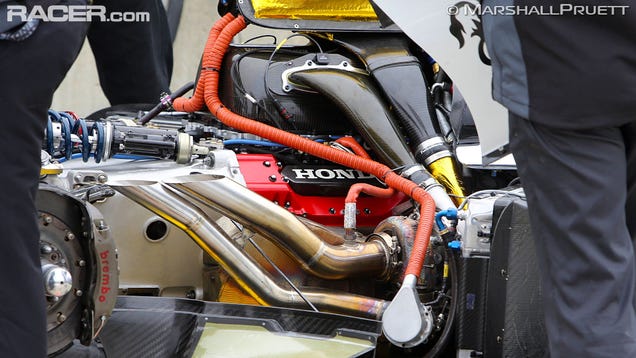2.2L V6 twin- or single-turbo
750-800hp
Engine lease price of $695,000 per season (bargain!)
Indycar specifies 5 engines per season (which is fine because they are highly reliable)
Bernie would be pleased to attract the might of General Motors to F1. While competition at the Indy500 would be a boon for Mercedes and Ferrari.
I understand where you're coming from and there is some merit in the suggestion.
The problem with the current F1 regulations is that on one hand the FIA want "modern" relatively fuel-efficient Hybrid Power Units which are incredibly expensive to design, produce and perfect. On the other hand, they want cost reduction. (Whoever thought the two wouldn't be mutually exclusive should try using their second brain cell.)
Then, in order to prevent a PU development war and contain costs, they've created an artificial restriction on development that largely prevents any engine manufacturer catching up if they didn't get it right first time.
Would an athlete accept some one telling them they're not allowed to train harder to catch the guy who beat them last time? Of course not.
Even when Red Bull were dominating, there were no rules in place that prevented other teams from catching up. Now there are.
This token stuff is bullsh*t.
I think Mercedes have done a great job and deserve success, but the way the rules are currently implemented is at odds with notion of open competition.
F1 should be the pinnacle of engineering and if they want to pretend to be "green", then they should implement a formula that promotes innovation and efficiency.
Take a leaf out of WEC's book. Give them X joules of energy for the race with a maximum energy consumption rate (to prevent qualifying monsters) and leave the rest to the engineers.
The PU could be turbo or NA, any number of cylinders, any size, and with any size energy store. The only restriction is that the PU (batteries excluded) must fit within a "box" of specific physical dimensions and it must have standard pick-up points to enable it to become a stressed chassis member and be adaptable to different chassis. The PU must be available to multiple teams and at a price not exceeding X dollars/Euros/Pounds, etc.
The Indycar engine route addresses some of the issues, but it's still "more of the same" and corrals innovation down a certain (potentially blinkered) path.
I dislike the current restrictive F1 engine formula, but trading it for "just another type of engine" does little for technical advancement or innovation.
Edited by Redback, 18 March 2015 - 08:22.
![]()


![]()
![]()
![]()



































